‘The Reluctant Fundamentalist’ Remains Fundamentally Reluctant
What’s in a Name? The author Moshin Hamid has constructed a novel that analyzes personal and national identity. In addition, whether intentionally or not there is subliminal word play among his three main characters, Changez, Erica and Chris. The Muslim origin of the name Changez means firm and solid while in English, these three names are partial anagrams; Changez = change, Erica= America, and Chris=Christian. Additionally, there is a threefold relationship between Changez, Erica and Chris. Changez the protagonist in this story is a Pakistani who immigrates to America. Changez falls in love with Erica yet Erica is in love with Chris. However, Chris is dead. Conceivably, the author is projecting a change in America’s Christian fundamentals. First, a comparative overview of the novel and the film titled The Reluctant Fundamentalist. Second will be an exploration into Changez’s personal and national identity.
Comparative Between Novel and Film
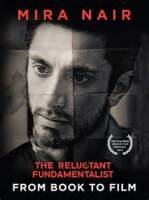
Moshin Hamid wrote The Reluctant Fundamentalist, and Mira Nair directed the film. Sometimes a film based on a novel falls short in expectation. Still, in this instance, the novel and the film are quite equal. Though, there are some differences between the novel and the film. For example, the novel has a languid pace while the momentum in the film rivets with action and suspense. The film also offers more contexts to the senses. For instance, the film starts off with chants from qawwalli singers and then takes you into the soul of Pakistan through the café with food, community, and architecture. The Islamic influences are clear by the arabesque motifs on the structures as well as segregation between men and women in certain situations. The film also allows you to bear witness to some of the experiences Changez’s encounters after 9/11.
Moshin Hamid addresses racial profiling. While Changez travels through the airport with his colleagues, government officials detain only him. “Armed sentries manned the check post at which I sought entry: being of a suspect race I was quarantined and subjected to more inspection” (157). However, the film intensified the racial profiling. First, we saw ethnic profiling at the airport followed by disrobing among strangers, and the most offensive action was when a government official digitally sodomized Changez. The film expressed this emotional turmoil deeper than the novel. There are other differences as well, such as some changes in the subplot and storylines.
A couple of changes in the story line revolve around Erica. In the film, Erica is a photographer while in the novel, she is a writer with severe mental health issues. The novel allowed for more relationship development between Changez and Erica while expanding upon Erica’s mental health issues. Furthermore, the cause of death for Chris is different. In the novel, he had cancer; in the film, Changez’s said Erica was the reason for his death. As Changez pointed out in his furious state that it was because of her recklessness that Chris was dead. It was because she chose to drive drunk. Erica was just as reckless in her art show while exposing sensitive situations in their personal and sexual relationship. The intensity continues with a subplot change. Early in the film an American citizen is kidnapped. The CIA becomes involved and Pakistani students protest. The novel possibly alluded to parliamentary strife yet; the film’s subplot brought to mind questions of personal and national identity.
Here is a trailer from The Reluctant Fundamentalist.
Personal Identity
While Changez explores New York, he recognizes some parallels and contrasts with Lahore. “The congested, mazelike heart of the city-Lahore is more democratically urban, and like Manhattan, it is easier for a man to dismount his vehicle and become part of the crowd” (31). Conversely, four thousand years ago Lahore was a very progressive civilization. Presently, Lahore does not compare to the present-day state of New York. Still, Changez felt comfortable in New York. He met taxi drivers that spoke Urdu and drove him to places serving traditional foods like samosa and channa while familiar songs filled the air from a parade of South Asian revelers. Changez began to identify as a New Yorker.
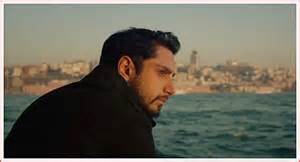
Many people in Western society define themselves with their line of work such as; I am a writer, artist, or a teacher. Changez identified as an analyst for Underwood Samson, and his Anglicized accent had benefits as it reflected wealth and power. Changez’s work ethic began while he was at Princeton; he had three jobs and maintained straight A’s. Many immigrants who come to America work harder to prove their existence. Changez’s identity is just like those diligent immigrants with strong work ethics. Changez identified closely with one of his colleagues whose family emigrated from the West Indies. They shared moments of not fitting in with the rest of their colleagues, and they shared a meal at Pak-Punjab Deli. His colleague’s delight of the Pakistani cuisine really endeared him to Changez; he had found “A kindred spirit” (38).
Changez met Erica, and it was love at first sight. Eventually, he met her affluent American parents. Erica’s parents lived in a penthouse in New York. Her father offered Changez a drink. He also offered this remark, “I had a Pakistani working for me once, never drank.”(53) Changez informed him he does drink and thanked him. Upon completion of dinner Erica and Changez attended an exclusive gathering in Chelsea. Here he watched Erica shine like a beacon among the huddled masses. Changez had strong feelings for Erica yet she was still holding on to Chris. Her whole life was about Chris, and she was resolute on holding on to the past and not letting go of Chris. She gave Changez bits and pieces of herself, and he grasped and held on to these minuscule scrapes and savored every single morsel.

Changez finally enters into an intimate relationship with Erica. He senses her not fully engaged in the act of sex. Changez asked Erica if she is thinking of Chris. And she says yes. Changez whispers to Erica, “Then pretend, pretend I am him” (105). Changez gives himself away to meet Erica’s needs. The moment he uttered the words, “Pretend I am him” was the moment his identity was completely jeopardized. Afterward, Changez recalled, “I felt at once both satiated and ashamed” (105). Changez wanted Erica to love him; he denied who he was to please someone who could never love him completely. Changez examines his actions, “Perhaps by taking on the persona of another; I had diminished myself in my own eyes; perhaps I was humiliated by the continuing dominance…” (150) He was unable to penetrate her sphere, and this affected his identity. Changez declared, “I lacked a stable core. I was not certain where I belonged – in New York, in Lahore, in both, in neither…” (148)
In the film, Changez experienced this betrayal from Erica when he went to her art exhibition. He saw the words “Pretend I am Him” and “I had a Pakistani Once” projected on the gallery walls. Changez’s most intimate and vulnerable moments were displayed for the rest of New York, the rest of America to witness. Erica projected his personal and national identity on the walls and could not comprehend why he was so upset. Erica felt that he was taking it all wrong. Changez longed-for his national identity.
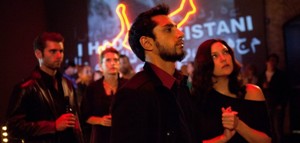
National Identity
The author Hamid explains the duality of nationalism with this quote, “Do not be frightened by my beard. I am a lover of America. I am both a native of this city and a speaker of your language; I thought I might offer you my services” (1). In the film, Changez has returned to Lahore and immerses back into his Pakistani nationalism. Another distinguishing element in the film is that Changez becomes a university professor. He motivates his students to have pride in their Pakistani nationalism. It is clear through the novel, and the film that Changez has chosen Pakistan as his home, however, he still harbors a dual tenderness for his American nationalism as he proclaims, “I am a lover of America” (1).
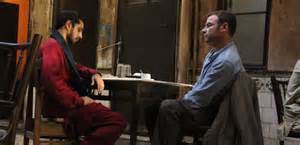
Changez also loved his prestigious job, which offered him entry into many élite opportunities. Capitalism was one of those opportunities. Capitalism and nationalism travel in the same circle as do Changez and his American work associate Jim. They share a common background of economic status or lack-there-of. Changez’s grandparents were Pakistani capitalists. However, events happened in Pakistan that left Changez without the funds to attend an Ivy League school in America. Nevertheless, this did not stop Changez from obtaining his American dream. Jim as well came from a family that did not have the funding to pay for his education at Princeton. Jim felt compelled as did Changez to hide this fact from their school mates, since they were born into privilege and did not know what it was to struggle financially. Jim and Changez were comrades in the Wall Street jungle. Although, after a few take over’s Changez began questioning his capitalistic nationalism. He was aware this job provided a great amount of money and opportunity but at a cost. Changez was challenging Jim and the ethics of his work. “But fortunately, where I saw shame, he saw opportunity. And he was, in some ways but not in all-as I would later come to understand-correct” (9). Revisiting Changez’s romantic relationship with Erica, there are some issues about nationalism that arise.
While Changez fell for Erica’s regal airs and physical attributes, he became aware that she needed constant stimuli, and he provided her relentless attention and reassurances. Changez tried to merge his existence into hers. He gives himself away, akin to immigrants entering America. America wants them to assimilate and adopt American nationalism. America holds on to old manners and beliefs and does not want to take on new convictions, just like Erica holds on to Chris. No matter how hard Changez tries in this relationship with Erica, he is not met with the same amount of vigor and compassion. Changez reflects upon his relationship with Erica.
No, hers was an illness of the spirit, and I had been raised in an environment too thoroughly permeated with a tradition of shared rituals of mysticism to accept that conditions of the spirit could not be influenced by the care, affection, and desire of others. What was essential was that I seek to understand why I had failed to penetrate the membrane with which she guarded her psyche; my more direct approaches had been rejected, but with sufficient insight, I might yet be welcomed through a process of osmosis. (140)
While Changez assigns meaning to his romantic relationship and his work relationship, his life in America is about to change.
Transition
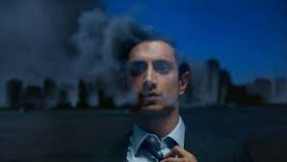
On September 11, life for Changez changed. He experienced the illustrious sector of America with his Ivy League education, prominent employment and romantic liaison. However, once the twin towers tumbled Changez’s life fell away. Changez saw a hostile side of America. The once impermeable America rejected him and caste him out of her sphere. Changez’s reaction to these external forces confused and frustrated him. He began to self implode and wage his own internal civil war like the one at home between Pakistan and India. He began a shift in perspective about his nationalism. He grew a beard to identify as a Pakistani. He received unfavorable remarks about his beard at work. He was asked to remove it. This increased his dissidence. Meanwhile, Changez received an assignment that took him to Santiago, Chile. He and Jim went to measure the worth of a publishing company with the intent to trade and sell lives. This was a pivotal point for Changez after bearing witness to his displacement in America.
Changez met Juan Bautista, the chief of the publishing company and the man who helped Changez become conscious of his life choices. Changez became close to the publisher due to a mutual familial love of books. Juan Bautista had an intimate conversation with Changez, he told him a story.
Have you heard of the janissaries? No, I said. They were Christian boys, he explained, captured by the Ottomans and trained to be soldiers in a Muslim army, at that time the greatest army in the world. They were ferocious and utterly loyal: they had fought to erase their own civilizations, so they had nothing else to turn to. How old were you when you went to America? he asked. I went for college, I said. I was eighteen. Ah, much older, he said. The janissaires were always taken in childhood. It would have been far more difficult to devote themselves to their adopted empire, you see, if they had memories they could not forget. (140)
Changez searched his soul and thought,”I was a modern-day janissary, a servant of the American empire at a time when it was invading a country with a kinship to mine and was perhaps even colluding to ensure that my own country faced the threat of war” (151). Changez left his American capitalist creations, his prosperous employment, his New York apartment, and his Erica. He made this decision unlike the decision that America made for him after 9/11. He returned home to Pakistan.

Conclusion
“All I knew was that my days of focusing on fundamentals were done” (153). Changez came from a nation bountiful with Islamic fundamentals. He entered a new life in America that is abundant in Christian fundamentals. He experienced the fundamentals of an Ivy League education and learned the fundamentals of Underwood Samson. His romantic experience with Erica had a mysterious set of fundamentals as does each personal relationship. Fundamentals are the building blocks of human existence; rules and limits are declared and measured. These fundamentals work for most. However, people who are free thinkers or artists find their spirits caged under fundamentalism. For example, a writer must conform to the fundamentals of grammar even if their spirit takes them in some other direction. It is clear fundamentalism crosses all borders, and fundamentalists demand the taming of wild spirits. Fundamentalists bring order and a certain sense of functionality and reluctantly squelch chaos. Nevertheless, Friedrich Nietzsche said, “Out of Chaos comes a star,” all the while, Changez reluctantly dispels fundamentals.
Works Cited
Hamid, Moshin. The Reluctant Fundamentalist, 2007.Houghton Mifflin Harcourt, New York. eBook
The Reluctant Fundamentalist (2012) Director Mira Nair Production Company Cine Mosaic.
What do you think? Leave a comment.











I saw The Reluctant Fundamentalist recently and was blown away. I had no pre-concieved notions upon entering, nor had i ever read the book. I loved it. I thought it was a really important movie, with a perspective of terrorism, America, and American society as well as Pakistan that is rarely ever touched upon. I thought it was terrific.
I was not aware of this film or the book until my brilliant professor suggested these important pieces of work. I believe the movie is now streaming on Amazon Prime, so now I have the film, the book and the soundtrack I was very impressed all of these talented people. Thank you for your support Liza.
Great adaptation. Sure, it had its differences from the book (which I loved), but Mira Nair’s interpretation was a powerful standalone film that raised painful questions about nationality and American society without becoming self-congratulatory. The cast was outstanding – with special props to Riz Ahmed – and the atmosphere of the movie was an effective mix of decadence and dread.
Thank you so much for acknowldeging the actors, they were all captivating.
I thought that the style of writing of the book would make me lose interest, since it was a one-sided conversation. However, I was gripped from the beginning and could not put it down. It expresses complex feelings, thoughts and ideas about the USA in a way that allows one to be honest with oneself about the USA with its immature reactions to perceived threats, its arrogance and violence as well as the sense of expansiveness, possibility and freedom that it allows.
It pushes you to embrace the contradictions in life and the love/hate relationships we all have with many things and people, not just the USA. I loved it from start to finish and have read it twice already.
I agree the book has a unique style, I read it once and then did the audio version that was great as well. I liked the audio because I could hear the correct pronunciations of the the names places, etc.
This book helped me to understand the process of disenchantment for would-be capitalists studying in the United States
Yes, the book and the film gave us a perspective from both sides and how it is easy to get caught up in captialism and then the other side of how it has the potential to destroy lives.
Capitalism is also a gender, racial and a socioeconomic disenchantment for those who are already citizens.
Great acting, good storyline, although I did have reservations when I got it thinking it could be bollywood ish, but it proved not to be.
There is a wonderful article on bollywood currently available on The Artifice. I really enjoyed the music in this film I have added it to my playlist.
Great book and great movie. Could have but cut shorter I think.
Yes the book and the movie were very well done.
I thoroughly enjoyed this movie. It was thought provoking, intelligent and I found all the actors did a fine job.
I agree the actors were very good believable and thank you for bringing that aspect to the conversation.
I love this book. And I absolutely love the ending because it shows the ambiguity and precariousness of the Pakistani-American relationship.
Yes Roy, the novel does have a very different ending and allows you to bring your own perspective to the story. Thank you very much for your comments I enjoyed reading it.
A great read.
Many thanks untie and thank you for reading it!
My initial reaction to this was, “I didn’t like it very much,” but, in retrospect, I tend to revert to a “like/dislike” analysis when I am struggling with something unfamiliar. From a farther distance, this is an interesting window into one way in which an immigrant’s view on a new country can shift radically. I also found it interesting to see an outsider’s perspective on the United States’ mental health system.
Walta, this is a nice introspective response and glad to hear it came to resonate with you. Yes, continuing conversations on the mental health system is vital for the community. I invite you to create an article on this subject and I look forward to your perspective. Cheers
Great article! I haven’t seen this film, but I’ve seen some of Mira Nair’s previous work. She is a great director who is really versatile. She has made all kinds of films in different genres. Some of them may not click, but I love how she tries not to repeat herself.
Amena, thanks for your information regarding the director. I have seen a few of her films and intend to view more. I appreciate the stance she took at the Haifa International Film Awards, due to Israel’s colonization of Palestine.
The book was a great, easy, thought-provoking read.
Thanks for stopping by Holden!
This is a mind-blowing book in many ways. The film, not as much, but still a good production.
So my question is …is changez in the book a reluctant? OR a fundamentalist? I have to write my essay on it! Some suggestions would help!
Mano. Thanks for reaching out for assistance with your essay. Moshin Hamid’s written work presents Changez as more of a reluctant as in opposition to Mira Nair’s film presentation where he is more of a fundamentalist. Hamid’s Changez is more subtle and cerebral as we walk through his experiences.
In the book Changez is much more concerned as many young students are with social acceptance. He is vested in the often one-sided romantic relationship with Erica who is mentally challenged as opposed to the strong female character in the film. Changez reluctantly bends to Erica and her family’s whims as to what a Pakistani is suppose to be; whereas, a fundamentalist might be more inclined to challenge these prejudices. Changez reluctantly cloaks his personal and national identity to maintain friendships as well. He works in the library to supplement his income additionally; he works in the section of the library he knows his friends would never enter.
However, when Changez is chosen to work in the corporate atmosphere we see a change in Changez. Here is aggressive and ruthless in the name of capitalism not fundamentalism. On the other hand, after the 911 incident things changed for Changez. He was seen by his friends, colleagues and strangers as an outsider, an enemy. He endured mistreatment due to his nationality. This could have enraged him to lash out in a fundamentalist manner. The opportunity was ripe; yet, the book did not promote a fundamentalist response.
Later in the book, we see an ethereal change in Changez during the acquisition of the book store. Changez is confronted with continuing down the path of capitalism at any cost or seeing the value in humanity. As we know which direction he chose I would again say he was reluctant to continue to be a capitalist. Changez’s decision to return home to Pakistan still echoes more on the reluctant side than the fierce expression we have when we hear the term fundamentalist.
Mano if you would like to discuss this further please PM me. My book is highlighted throughout with citations.
There seems to be a torn sense of identity.